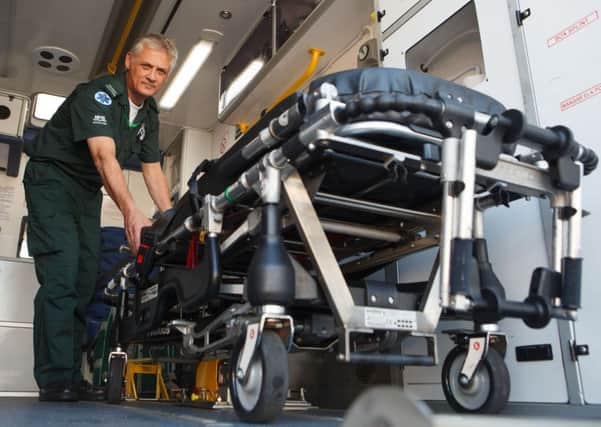Two thirds of Scots ambulance crews assaulted by drunks


The Scottish Ambulance Service, in partnership with Alcohol Focus Scotland, conducted a survey of frontline ambulance crews and 999 call handlers to show the effect that alcohol has on the service.
More than 600 staff responded, with two thirds of them (62 per cent) saying that they have been physically assaulted by members of the public who have had too much to drink. Three quarters (76 per cent) of staff experience verbal abuse in these situations.
Advertisement
Hide AdAdvertisement
Hide AdStaff said that more than half of callouts they deal with at weekends are alcohol related. During weekdays, one in six incidents (17 per cent) involve alcohol, rising to almost half (42 per cent) on weekday nights.
A quarter of responses to slips, trips or falls are alcohol related and it is seen to be a factor in almost half of responses to assaults.
Pauline Howie, Chief Executive, Scottish Ambulance Service, said:
“Alcohol has a significant impact on ambulance operations across all of Scotland. It is no longer a weekend phenomenon as crews have to respond to alcohol related calls every day of the week, taking resources away from those who need us most.
“The survey reveals the burden that alcohol puts on ambulance staff across the country. They are highly trained emergency clinicians and are frustrated that so much of their time is spent dealing with patients who are simply intoxicated. On top of that they have to deal with the violence and aggression that goes so often with alcohol misuse.
“Our frontline staff should not have to fear for their own safety when treating patients, yet alcohol is all too often the key factor in assaults. Staff respond to patients in all weathers and situations and deserve the public’s respect for the high quality care that they provide. Assaults or threatening behaviour are reported to the police and staff have access to support and counselling services.
Alison Douglas, Chief Executive of Alcohol Focus Scotland, said:
“The impact of alcohol on the Scottish Ambulance Service is completely unacceptable and unsustainable. Christmas and New Year is a particularly busy time for call outs, but mopping up the mess caused by excessive drinking is something that ambulance crews do day in, day out. It is appalling that ambulance staff are regularly subjected to verbal and physical abuse from drunk patients and bystanders.
Advertisement
Hide AdAdvertisement
Hide Ad“Encouraging individuals to drink less is difficult when we are surrounded by cheap alcohol that is constantly promoted as an everyday product. Addressing the affordability of alcohol through minimum unit pricing is an effective way to protect vulnerable citizens, create safer communities and support emergency services.”
Last year emergency ambulances responded to almost 750,000 emergency incidents and on a typical weekend, they attend over 3,600 callouts.